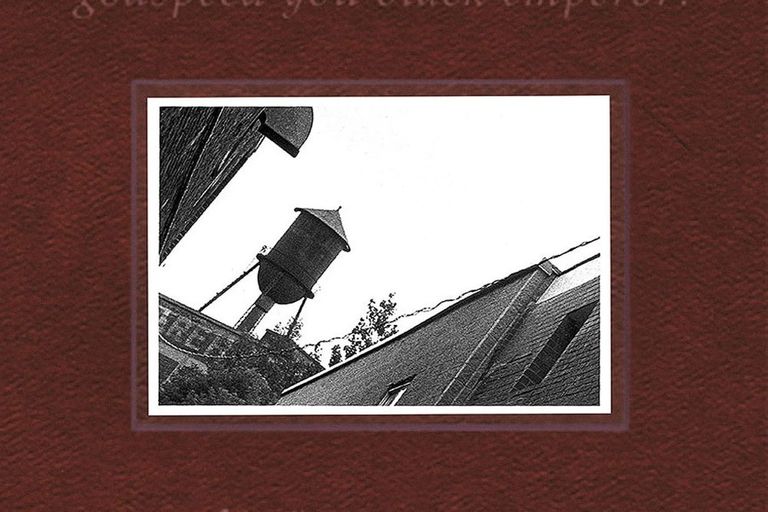
Conrad Horychun, Grade 10

This is a review of the band Godspeed You! Black Emperor’s debut album, F♯ A♯ ∞.
The Cowboy stands in the middle of a cracked road, staring down his opponent through ash-smeared goggles. The Sad Mafioso’s tattooed face glares back, leather jacket flapping in the harsh wind. Both of their hands hover above holstered pistols, sweat pooling in the bottoms of gloves. Deafening silence echoes between the two before both draw steel, lightning quick. A resounding crack whips across the black sands.
The world is ending. The stage is set for Godspeed You! Black Emperor (Godspeed), a Canadian post-rock band from the impoverished bowels of Montreal, to reveal their musical brilliance to the underbelly of rock. On August 14th, 1997, the downtrodden of Montreal bore witness to the legendary release of their magnum opus. Let us drown in the bleak expanse of F♯ A♯ ∞.
F♯ A♯ ∞ is almost more akin to a film than a collection of songs. It is littered with field recordings and soaring ambient soundscapes, immersing the listener in The Cowboy frontiered hellish landscape. The instrumentation only adds to the experience with slide guitars and bowed strings punctuated by rough hewn rock crescendos and staticky voice recordings. It sets a very strict mood, one that pervades throughout the album until the needle lifts. Poor mixing, bordering on garage, is utilized as well, giving way to visions of dusty plains and asphyxiating smog through the grainy audio. Nowhere is this more obvious than the album’s first track, “The Dead Flag Blues.”
“The Dead Flag Blues” begins with an almost inaudible warbling, followed by a poem written by frontman Efrim Menuck. It details the fall into apocalypse but also hides (poorly) Godspeed’s position in politics: “The car’s on fire. And there’s no driver at the wheel.” Straight from the beginning, the album pulls no punches, dragging the listener into a world of despair. This world was one the band was currently experiencing during the writing and recording of the album; their hometown of Montreal was crumbling beneath their feet while people left the city and poverty increased. But not everything is without hope, not for Godspeed or The Cowboy.
On the third and final track, “Providence,” the triumphant anthem of The Cowboy plays, victorious in an ocean of loss. Much like the opener, the field recording intro of “Providence” illustrates a world on the brink of complete annihilation, but the song ends with a glimpse of light, a spark in void. “Kicking Horse on Broken Hill” is the album’s thesis statement, despite being the last musical movement on the original recording. The music swells, and with it, so too does hope that The Cowboy will survive and make it to his unknown destination.
The Cowboy works through immeasurable hardship, a kicking horse on a broken hill. One could say that the album is devoid of hope, and I would have to disagree. The album is among the most hopeful there is; complete absence of light makes even the tiniest flame meaningful. There’s something truly inspiring about The Cowboy’s struggle—that even in the face of absolute defeat he stands unwavering.
F♯ A♯ ∞ is a fantastic album, maybe one of the greatest ever written, and one everyone should certainly listen to at some point. From the hopeful takeaway to the crashing climaxes, the desolate tone to the grimy distortion, every piece of the album fits together to create an experience that can be found nowhere else.
The Sad Mafioso crumples to the ground, a bullet embedded in his skull. His engraved pistol clatters to the pavement beside him, The Cowboy jamming the smoking barrel of his own revolver into its holster. He adjusts his ragged hat and stained cloth mask, looks out over the silent dunes, and continues trekking deeper into the heart of these newly formed hinterlands.